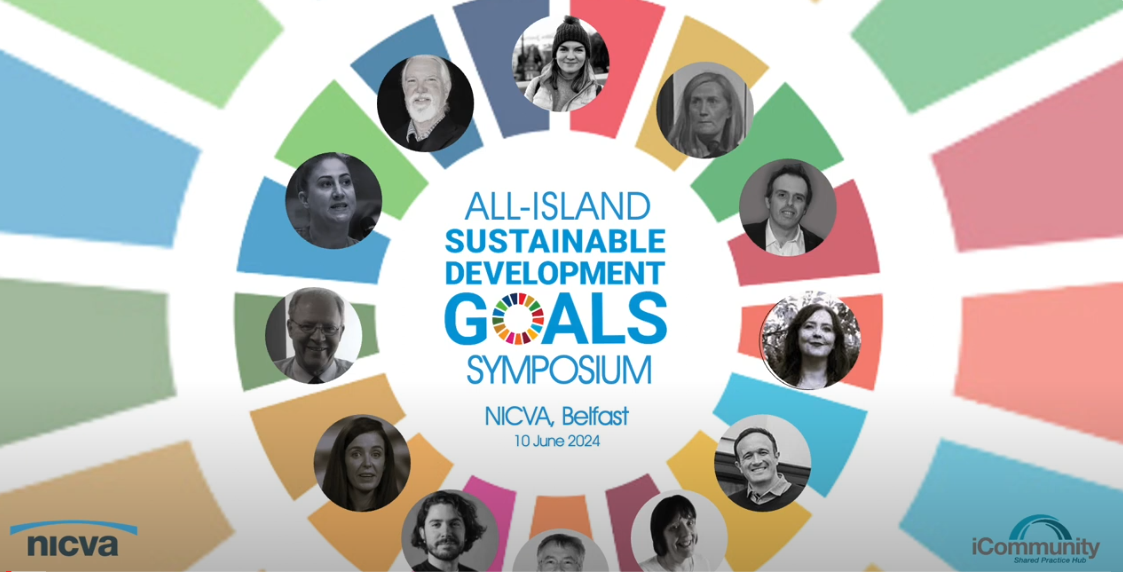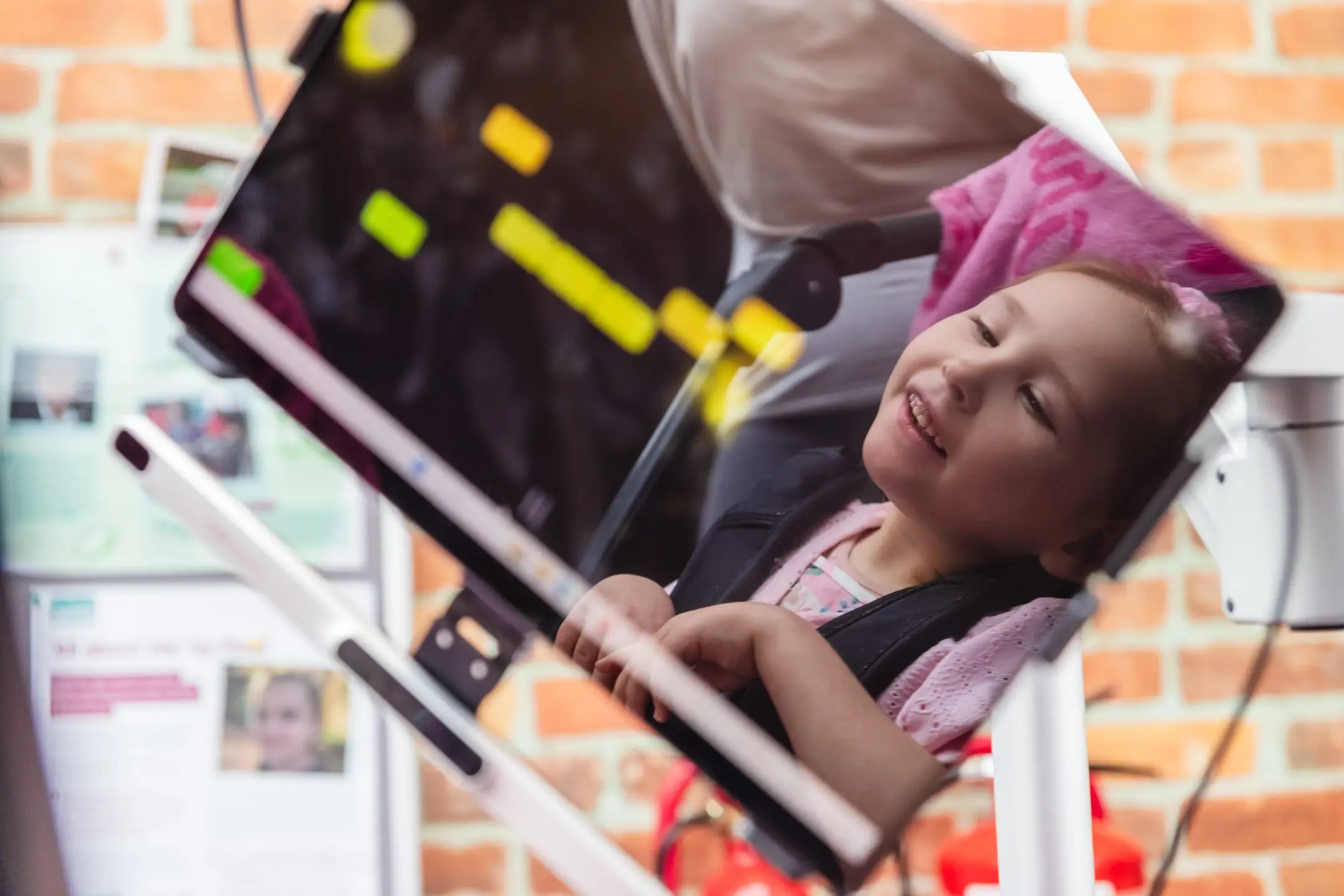iCommunity’s All Island SDG Symposium – A Look Back

iCommunity’s recent All Island SDG Symposium was opened by Celine McStravick CEO of NICVA and featured a range of expert speakers and workshop hosts who shared their insights and experiences related to the achievement of the 2030 agenda and the Sustainable Development Goals. Celine welcomed speakers and guests to the iCommunity event created as part of NICVA’s ongoing partnership with the Wheel. She highlighted how “deeply intertwined the work of the community and voluntary sector on the island is with the SDGs” and their “universal call to end poverty, protect our planet, and ensure that all people enjoy peace and prosperity”.
David Donoghue, a former senior Irish diplomat and co-chair of the global negotiations on the Sustainable Development Goals, explained their origins and his continued engagement with sustainable development, migration, refugee concerns. He promoted the value of local voluntary reviews as an important international partnership opportunity particularly for Northern Ireland and the Republic of Ireland.
Sylvester Murphy from Enclude shared his vast experience in organizational development and business solutions, particularly emphasizing his role in implementing IT strategies for the community and voluntary sector. At the afternoon workshop Sylvester was joined by Elizabeth Kelly, Deputy CEO and Senior Development Manager at Enclude, who discussed her work in supporting clients on their digital journeys and deploying systems that enhance their operational effectiveness, drawing from her extensive experience in both the business and non-profit sectors.
Emma Shaw, Founder and CEO of The Phoenix Education Centre, elaborated on her commitment to transforming education for the most marginalized or ‘farthest behind first’ and that promoting equity includes the importance of digital inclusion in learning environments to ‘leave no one behind’.
Orna Young, Co-Founder and Managing Director of FactCheckNI, emphasized the importance of fact-checking in our digital world and in maintaining peace and security in Northern Ireland and its role in supporting informed public discourse. Emma further expanded on this in her afternoon workshop.
Stephen Dallas from the Bytes Project described his dedication to creating opportunities for young people in Northern Ireland, focusing on digital inclusion and emotional health and wellbeing.
Bobby McCormack, CEO of Development Perspectives, shared the experience of being a SDG champion organization in the ROI. He also spoke about the power of Global Citizenship Education, underlining his efforts to foster global understanding and cooperation.
Gerard Carlin, Head of Climate Change at Northern Ireland Water, detailed his experience his role in addressing climate change through collaboration and partnership including with communities. He spoke about the opportunities to learn and co-create solutions with communities and willingness to meet with the sector to further community engagement.
Dr. John Barimo from UCC introduced the Sustainable Development Solutions Network Ireland, highlighting its mission to accelerate progress on the SDGs through collaboration among knowledge institutions and its North/South and East/West. He is working with colleagues to further the UN (SDSN) under the auspices of the UN Secretary-General to “mobilize the world’s universities, think tanks, and national laboratories for action on the Sustainable Development Goals (SDGs) and the Paris Agreement; empower societies through free online education; and translate scientific evidence and ideas into solutions and accountability”.
Dr. Amanda Slevin a member of the SDSN from Queen’s University Belfast discussed her work on climate action, including her role in developing NI’s climate bill and her ongoing aim of translating policy into actionable community co-created initiatives. She also spoke about the need for all-island policy alignment on Climate adaptation and mitigation.
The event also featured pre-recorded presentations by:
- Dr. Mary Smyth from the CSO presented data on SDG Goal 17, emphasizing partnerships for achieving sustainable development goals and the importance of data in tracking progress.
- Tom Lindsay, Director and Co-Founder of ACT, who focused on practical strategies for sustainable development and the use of sustainability management software to support various organizations in achieving their goals.
- Meaghan Carmody, former Coordinator of Coalition 2030, reflected on her work with Irish Civil Society Organizations to promote the SDGs.
Workshops Summary
The All-Island SDG Symposium also featured several workshops that provided practical insights and fostered discussions on some of its critical themes: climate and migration, digital transformation, and misinformation. Here are the summaries of the key points from these workshops:
Workshop 1: Climate and Migration
SDG 13 – Climate Action & SDG 10 – Reduced Inequalities
This workshop examined the intersection of climate change and migration, focusing on how communities can support a just transition. Key points included:
- Community Involvement: Emphasized the importance of creating local partnerships and Global South connections to make climate impacts more tangible and personal.
- Collaboration: Highlighted the essential role of communities in education and consciousness-raising, about issues such as migration and perspectives from other countries about their experiences including the experience of colonialism and its impacts, noting the value of sharing ideas across civil society groups.
- Storytelling: Stressed the power of lived experiences and storytelling in inspiring action and engaging legislators.
- Hope and Agency: Encouraged positive narratives to empower people and prevent overwhelming them with the magnitude of issues.
- Climate and Peace: Underlined the close link between climate action and peace, advocating for tools and opportunities that enable community action.
Workshop 2: Digital Transformation
SDG 9 – Industry, Innovation, and Infrastructure & SDG 4 – Quality Education
Elizabeth Kelly and Sylvester Murphy from Enclude discussed how digital technologies can enhance service and data collection, management and use in Ireland’s community sector. Key takeaways were:
- Digital Journey: Highlighted that digital transformation is a continuous journey rather than a one-time event.
- Change Management: Noted the significant role of change management in digital projects.
- Pacing and Funding: Discussed how digital transformation can be slow and funding-dependent, presenting unique challenges.
- Digital Literacy: Identified digital literacy and skills gaps among staff and board members as obstacles to implementing digital solutions.
Workshop 3: Digital Fact-Checking
SDG 16 – Peace, Justice, and Strong Institutions & SDG 17 – Partnerships for the Goals
Dr. Orna Young from FactCheckNI presented on the importance of digital fact-checking in combating misinformation. Key points included:
- Critical Thinking Skills: Highlighted the lack of critical thinking education, particularly among young people.
- Misinformation Encountered: Noted that a significant number of internet users have encountered potential harm online.
- Weaponizing Fact-Checking: Addressed the rise of certain groups, including the far-right, using fact-checking as a tool for their agendas.
- Emotional Response: Encouraged people to reflect on their emotional responses to online content to identify manipulation.
- Distinguishing Facts from Opinions: Stressed the need to distinguish between facts and opinions and to use clear, open communication and data.
- Transparency: Emphasized the importance of transparency regarding who funds and runs and makes decisions in fact-checking and all community organizations.
These workshops provided valuable insights into addressing some of the critical challenges related to achieving and contributing to the Sustainable Development Goals, from fostering community involvement in climate action to enhancing digital literacy and combating misinformation.


